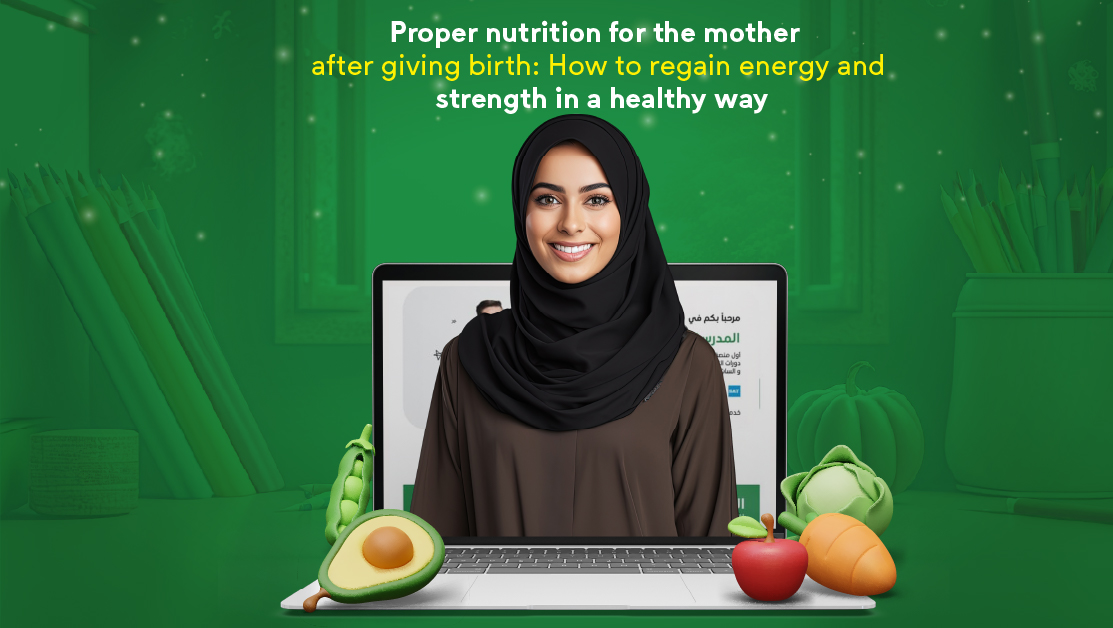
Giving birth is a life-changing experience that requires significant physical and emotional adjustments. In addition to caring for your newborn, it’s crucial to prioritize your own health and well-being, especially when it comes to nutrition. Proper nutrition plays a vital role in postpartum recovery, helping you regain energy, replenish lost nutrients, and support overall healing. In this comprehensive guide, we’ll explore the importance of Proper nutrition for the mother after giving birth and provide practical tips for achieving optimal health during the postpartum period.
Nutritional Needs After Childbirth
The postpartum period is a critical time for women’s health, as the body undergoes numerous changes to recover from pregnancy and childbirth. Proper nutrition is essential during this time to support healing, breastfeeding (if applicable), and overall well-being. Some key nutrients that are particularly important during the postpartum period include:
Iron: Iron is crucial for replenishing the blood lost during childbirth and preventing iron deficiency anemia. Good sources of iron include lean meats, poultry, fish, legumes, and fortified cereals.
Calcium: Calcium is essential for bone health, especially during breastfeeding, as calcium is transferred from the mother to the baby through breast milk. Dairy products, fortified plant-based milks, and leafy green vegetables are excellent sources of calcium.
Omega-3 Fatty Acids: Omega-3 fatty acids are important for brain development in newborns and can help reduce the risk of postpartum depression in mothers. Fatty fish (such as salmon and sardines), flaxseeds, and walnuts are rich sources of omega-3 fatty acids.
Protein: Protein is essential for muscle repair and recovery after childbirth. Lean meats, poultry, fish, eggs, dairy products, legumes, and nuts are all good sources of protein.
Fiber: Fiber is important for preventing constipation, which is common after childbirth. Fruits, vegetables, whole grains, and legumes are excellent sources of fiber.
Hydration: Staying hydrated is crucial, especially if you’re breastfeeding. Water is the best choice for hydration, but you can also consume other fluids such as herbal teas and diluted fruit juices.
Vitamins and Minerals: In addition to the above nutrients, it’s important to consume a variety of fruits and vegetables to ensure you’re getting an adequate intake of vitamins and minerals, such as vitamin C, vitamin A, and folate.
Tips for Healthy Eating After Childbirth
Eating a balanced diet is essential for postpartum recovery and overall well-being. Here are some tips to help you eat healthily during the postpartum period:
Eat Regular Meals: Try to eat three regular meals a day, with healthy snacks in between if needed. This can help maintain your energy levels and prevent overeating.
Include a Variety of Foods: Aim to include a variety of foods from all food groups in your diet to ensure you’re getting a wide range of nutrients.
Plan Ahead: Planning your meals and snacks in advance can help you make healthier choices and avoid the temptation of unhealthy foods.
Eat Mindfully: Take the time to enjoy your meals and pay attention to your hunger and fullness cues. Eating mindfully can help prevent overeating.
Stay Hydrated: Drink plenty of water throughout the day to stay hydrated, especially if you’re breastfeeding.
Get Plenty of Rest: Adequate rest is essential for postpartum recovery. Try to rest whenever you can and prioritize getting enough sleep at night.
Don’t Skip Meals: Skipping meals can lead to low energy levels and overeating later in the day. Try to eat regular meals to maintain your energy levels.
Listen to Your Body: Pay attention to your body’s hunger and fullness cues. Eat when you’re hungry and stop when you’re full.
Nutritional Challenges and Solutions
The postpartum period can present some unique nutritional challenges. Here are some common challenges and solutions:
Lack of Time: As a new mother, you may find it challenging to find time to prepare healthy meals. Consider batch cooking and freezing meals in advance, or ask for help from friends and family.
Fatigue: Fatigue is common after childbirth, which can make it difficult to prepare healthy meals. Focus on easy-to-prepare meals that are nutrient-dense, such as salads, soups, and smoothies.
Breastfeeding: If you’re breastfeeding, you’ll need to consume additional calories to support milk production. Aim to eat nutrient-dense foods, such as fruits, vegetables, whole grains, and lean proteins.
Postpartum Depression: Postpartum depression can affect your appetite and eating habits. If you’re experiencing symptoms of postpartum depression, seek help from a healthcare professional.
Weight Loss: Some women may be eager to lose weight after childbirth. However, it’s important to focus on gradual weight loss and avoid restrictive diets, as they can affect your milk supply and overall health.
Sample Postpartum Meal Plan
Here’s a sample postpartum meal plan to help you get started:
Breakfast: Whole-grain toast with avocado and poached eggs, served with a side of fruit.
Snack: Greek yogurt with honey and mixed berries.
Lunch: Quinoa salad with mixed vegetables, chickpeas, and a lemon-tahini dressing.
Snack: Apple slices with almond butter.
Dinner: Baked salmon with roasted sweet potatoes and steamed broccoli.
Snack: Whole-grain crackers with cheese.
Remember, every woman’s nutritional needs are unique, so it’s essential to listen to your body and adjust your diet accordingly. If you have specific dietary requirements or concerns, consult a healthcare professional or a registered dietitian for personalized advice.
Proper nutrition for the mother after giving birth
Proper nutrition for the mother after giving birth is crucial, as it supports recovery from childbirth, provides energy for the demands of caring for a newborn, and helps replenish nutrient stores depleted during pregnancy and delivery. A well-balanced diet can also aid in milk production for breastfeeding mothers. Here are some key components of postpartum nutrition:
Caloric Intake: While caloric needs vary depending on factors such as age, weight, activity level, and whether you are breastfeeding, most women require additional calories after giving birth to support recovery and milk production. Aim for a balanced diet that provides enough calories to meet your energy needs without promoting weight gain.
Hydration: Staying hydrated is essential for overall health and milk production. Drink plenty of water throughout the day, and include hydrating foods such as fruits and vegetables in your diet.
Protein: Protein is crucial for tissue repair and recovery after childbirth. Include sources such as lean meats, poultry, fish, eggs, dairy products, legumes, and nuts in your diet.
Iron: Iron is important for replenishing blood lost during childbirth and preventing postpartum anemia. Include iron-rich foods such as lean meats, poultry, fish, beans, lentils, spinach, and fortified cereals in your diet.
Calcium: Calcium is essential for bone health, especially if you are breastfeeding. Include dairy products, fortified plant-based milks, and leafy green vegetables in your diet.
Omega-3 Fatty Acids: Omega-3 fatty acids are important for brain development in newborns and can also help reduce the risk of postpartum depression. Include sources such as fatty fish (salmon, sardines), flaxseeds, and walnuts in your diet.
Fiber: Including fiber-rich foods such as fruits, vegetables, whole grains, and legumes can help prevent constipation, which is common after childbirth.
Vitamins and Minerals: A well-balanced diet should provide an adequate intake of vitamins and minerals. If needed, consider taking a prenatal or postnatal vitamin supplement to ensure you are meeting your nutritional needs.
Healthy Fats: Include sources of healthy fats such as avocados, nuts, seeds, and olive oil in your diet to support overall health and brain function.
Limit Sugary and Processed Foods: While it’s okay to indulge occasionally, try to limit sugary and processed foods as they can lead to energy crashes and provide empty calories.
It’s important to listen to your body and eat when you’re hungry, and rest when you’re tired. If you have specific dietary concerns or restrictions, consult with a healthcare provider or a registered dietitian for personalized advice. By focusing on nutrient-rich foods and staying hydrated, you can support your body’s recovery and well-being after giving birth.
The importance of nutrition during pregnancy
The importance of nutrition during pregnancy cannot be overstated, as it directly impacts the health of both the mother and the developing fetus. A well-balanced diet rich in essential nutrients is crucial for supporting the growth and development of the baby, as well as maintaining the mother’s health. Here are some key reasons why nutrition is so important during pregnancy:
Fetal Development: Proper nutrition for the mother after giving birth provides the essential nutrients needed for the baby’s growth and development. Nutrients such as folic acid, iron, calcium, and protein are critical for the formation of the baby’s organs, bones, and tissues.
Prevention of Birth Defects: Adequate intake of folic acid before and during pregnancy can significantly reduce the risk of neural tube defects, such as spina bifida, in the baby.
Healthy Weight Gain: Proper nutrition for the mother after giving birth helps ensure that the mother gains a healthy amount of weight during pregnancy. Excessive weight gain can lead to complications such as gestational diabetes and high blood pressure, while inadequate weight gain can result in low birth weight or premature birth.
Maternal Health: Pregnancy places increased demands on the mother’s body, and Proper nutrition for the mother after giving birth is essential for maintaining her health and energy levels. A well-balanced diet can help prevent pregnancy-related complications such as anemia and preeclampsia.
Support for Breastfeeding: Good nutrition during pregnancy can also set the stage for successful breastfeeding. Nutrient-rich foods can help ensure an adequate milk supply and provide the baby with essential nutrients during breastfeeding.
Postpartum Recovery: Proper nutrition for the mother after giving birth can aid in postpartum recovery by providing the nutrients needed for tissue repair and replenishing nutrient stores depleted during pregnancy and childbirth.
Overall Well-Being: Eating a healthy diet during pregnancy can improve the mother’s overall well-being, reduce the risk of pregnancy-related discomforts such as constipation and heartburn, and support her immune system.
It’s important for pregnant women to eat a variety of nutrient-dense foods, including fruits, vegetables, whole grains, lean proteins, and dairy products. They should also stay hydrated and avoid foods that may pose a risk to the baby, such as raw or undercooked meats, unpasteurized dairy products, and certain types of fish high in mercury.
In conclusion, nutrition plays a critical role in ensuring a healthy pregnancy and supporting the growth and development of the baby. Pregnant women should strive to eat a well-balanced diet and consult with a healthcare provider or a registered dietitian for personalized nutrition advice during pregnancy.
Diet for pregnant women
A healthy diet for pregnant women is essential for pregnant women to support the growth and development of the baby, as well as to maintain their own health. A well-balanced diet for pregnant women during pregnancy should include a variety of nutrient-rich foods to ensure that both the mother and the baby receive the necessary vitamins and minerals. Here are some key components of a healthy diet for pregnant women:
Fruits and Vegetables: These should form the foundation of a pregnant woman’s diet. They provide essential vitamins, minerals, and antioxidants. Aim to include a variety of colorful fruits and vegetables in your meals to ensure a diverse range of nutrients.
Whole Grains: Whole grains such as brown rice, whole wheat bread, and oats are rich in fiber and essential nutrients like iron, folate, and B vitamins. They help maintain energy levels and support digestion.
Protein: Protein is crucial for the growth and development of the baby. Good sources of protein include lean meats, poultry, fish, eggs, dairy products, legumes, and nuts.
Dairy Products: Dairy products are a good source of calcium, which is essential for bone development in the baby. Include milk, cheese, and yogurt in your diet to meet your calcium needs.
Healthy Fats: Omega-3 fatty acids are important for the baby’s brain development. Include sources such as fatty fish (salmon, sardines), flaxseeds, chia seeds, and walnuts in your diet.
Iron-Rich Foods: Iron is important for preventing anemia during pregnancy. Include iron-rich foods such as lean meats, poultry, fish, beans, lentils, spinach, and fortified cereals in your diet.
Folic Acid: Folic acid is crucial for preventing neural tube defects in the baby. Include foods rich in folic acid, such as leafy green vegetables, citrus fruits, beans, and fortified cereals, in your diet. You may also need to take a folic acid supplement as recommended by your healthcare provider.
Hydration: Staying hydrated is important during pregnancy. Drink plenty of water throughout the day, and limit caffeine intake.
Limit Sugary and Processed Foods: While it’s okay to indulge occasionally, try to limit sugary and processed foods as they can provide empty calories and lead to excessive weight gain.
It’s important for pregnant women to consult with their healthcare provider or a registered dietitian to ensure they are meeting their individual nutritional needs during pregnancy. They may also need to take prenatal vitamins to supplement their diet and ensure they are getting enough essential nutrients for a healthy pregnancy.
Conclusion:
Proper nutrition is crucial for postpartum recovery, helping you regain energy, replenish lost nutrients, and support overall healing. By eating a balanced diet for pregnant women that includes a variety of nutrient-rich foods, staying hydrated, and getting plenty of rest, you can support your body’s recovery and well-being during the postpartum period. Remember to listen to your body, seek help if needed, and prioritize your health as you adjust to life as a new mother.















